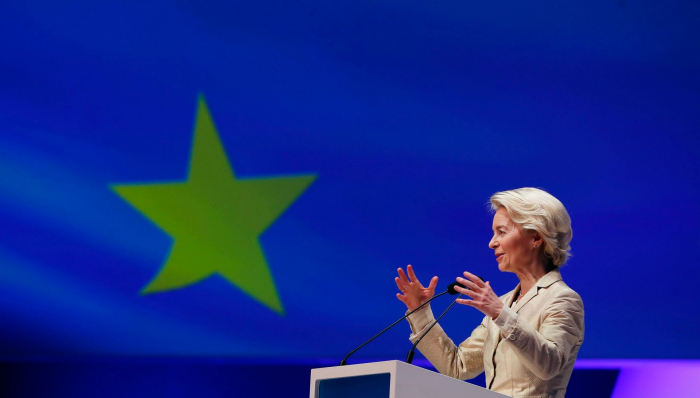Brussels could offer the U.K. a seat on a new “European Security Council” — if Ursula von der Leyen’s party gets its way in this year’s EU election.
The manifesto for the EU’s dominant center-right group calls for “the appointment of a European Security Council comprised of the leaders of EU member states and other European countries,” including “at least the U.K.”
The European People’s Party (EPP) has dominated the EU’s institutions for more than 20 years, including the current Commission — and is widely expected to come out on top in June's election.
The EPP confirmed its manifesto on Wednesday at a congress in Bucharest, but the EU’s mercurial political system means the creation of such a council is far from guaranteed to go ahead.
Fears among some lawmakers and member countries over EU mission creep on security could represent potential stumbling blocks for the idea.
But it could end up as an attractive proposition for European leaders eyeing their options in the event that Donald Trump returns to the White House next year.
A new era?
The EPP proposals suggest replacing the post of EU high representative for foreign affairs with an “EU foreign minister” who could “intensively coordinate with the other European countries, in particular the U.K.” and others.
Should the U.K. be invited to join such a security council, its participation is far from guaranteed. British Foreign Secretary David Cameron in December said he was against "over-structuring" defense and security relations with Brussels.
“There’s a danger sometimes of putting something into a structure that every single European country has to be consulted, everyone has to take part, you get absolutely surrounded by bureaucracy and nothing gets done,” he told lawmakers.
But with U.K. elections also due this year, a change of thinking in London seems possible. The opposition Labour Party, currently soaring in the polls, has repeatedly expressed an interest in a more structured security relationship with the EU.
Even when it was a member of the bloc, the U.K. was wary of EU defense integration, declining to participate in so-called “permanent and structured cooperation” (PESCO) projects.
Attitudes appear to be slowly shifting, however. In 2022, then-Defense Secretary Ben Wallace announced the U.K. wanted to take part in a PESCO project aimed at making it easier to move troops around the continent of Europe. The United States, Canada and Norway are already taking part on a similar basis.
Transparency woes
Asked what had changed during a parliamentary committee hearing last week, Defense Minister Timothy Minto pointed to the Russian invasion of Ukraine. Negotiations on U.K. participation are ongoing.
But the political risks on the U.K. side were illustrated after Conservative MPs on the European scrutiny committee raised concerns at the government’s decision to not publish the resulting agreement linking the U.K. to the project.
Minto said the agreement was not “necessarily suitable for parliamentary scrutiny” and the Ministry of Defense says such memorandums of understanding could contain classified information and are in any case not legally binding.
But Tory MP David Jones summarized lawmakers’ concerns about the secrecy, asking: “Can you understand why this committee finds it frustrating that we’re spending several sessions talking about an agreement that we’re unable to read?”
Politico
More about:
















































